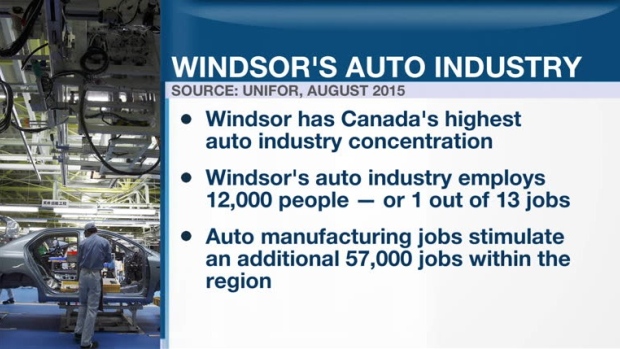Jan 25, 2017
Trump’s trade rhetoric not a concern for Windsor's mayor
, BNN Bloomberg
The mayor of Windsor, Ont. says he isn’t too concerned with talk of a border adjustment tax under U.S. President Donald Trump.
Mayor Drew Dilkens told BNN on Wednesday that while he expects Trump to pursue better deals with specific trading partners, he doesn’t expect that to result in an across-the-board import tariff.
“There’s a lot of rhetoric that creates uncertainty and people are trying to understand what it means at the end of the day,” Dilkens said. “I see that pivot point where they’re now focusing more on Mexico [and] they’re focusing more on China where they don’t seem to think they have fair trade.”
“If you look at protecting American workers - which President Trump has been so vocal about in bringing jobs back to the U.S. and protecting workers - to do anything that hurts or affects workers in the state of Ohio and the state of Michigan where there’s such great integration between Canada and the U.S. will actually serve to undermine what he’s pledged from the beginning.”
Dilkens pointed to comments made by Trump’s Secretary of the Treasury nominee Steve Mnuchin during his Senate confirmation hearing as an indication that the new administration was not interested in targeting Canada with a ‘big border tax’.
“When he’s referred to a border tax, he’s referred to a small number of companies that have moved their jobs or are moving their jobs, putting products back into the United States, and taxing them,” Mnuchin said in his Jan.19 hearing.
As far as Dilkens is concerned, a broad border tax would only cause a rift in what is already a well-integrated automotive industry in both Canada and the U.S.

He pointed to the Windsor-built Chrysler Pacifica as an example of a vehicle that needs to cross the border several times before it gets to market.
“It’s such an integrated economy,” Dilkens said. “Parts for our vehicles manufactured in our city cross the border on average seven times before they’re put into final assembly and shipped across North America.”
“In a border city like the City of Windsor there are a lot of jobs that rely on smooth and efficient border crossings and easy access to the U.S. market.”
Stepping away from the impact on his own city, Dilkens added that a border tax on Canada would also greatly disrupt the business many individual states are able to conduct north of the border.
“I think there are a number of processes that have to happen, that it won’t be unilateral decision-making by the President alone,” Dilkens said.
“To do anything that impacts the relationship between Canada and the U.S. – that effects the trade of goods between 35 of 50 states - that serves to undermine workers in those states, I think you’re going to have some sharp eyes who look at that and actually call the President and take him to task on anything that he proposes to do.”